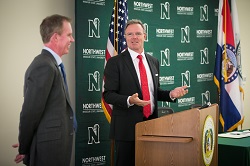Australia's Integrated Animal Health has struck its first major research pact in the Kansas City Animal Health Corridor, where it is preparing to open its U.S. headquarters. The company said this week it has formed a 10-year partnership with Northwest Missouri State University's (NMSU) Dean L. Hubbard Center for Innovation and Entrepreneurship.
Integrated Animal Health will work with Hubbard on new technologies meant to improve herd health. The company is developing a variety of feed additives to boost fertility, control the disease mastitis, promote weight gain, and reduce reliance on antibiotics.
 |
| Dr. Blake Hawley, president and chief executive officer of Integrated Animal Health's American operations (left) and Rob Neely, the company's founder and chief executive officer--Courtesy of Darren Whitley/Northwest Missouri State University |
The Kansas City Animal Health corridor, which reaches from Columbia, MO, to Manhattan, KS, encompasses 300 companies, as well as NMSU. The university's Hubbard Center is an incubator that focuses on technology startups and that provides assistance to small companies.
The announcement comes just a few weeks after Integrated Animal Health announced that it would open a U.S. office and appoint Blake Hawley as its president and CEO. The company also recently started marketing oxycodone patches to treat pain in animals.
"Northwest Missouri State University is a natural fit for our U.S. rollout" because of its fully functioning, working dairy, said Rob Neely, founder and CEO of Integrated Animal Health in a press release. "This cooperation will allow the students to play a big role in refining our cutting-edge science and existing technologies."
Added Hawley: "Providing adequate protein to the world is one of the key challenges facing people and governments around the world. We see Integrated Animal Health playing a significant role in this endeavor, because we will license out our technologies to provide the greatest exposure for improving livestock efficiencies globally."
- here's the press release